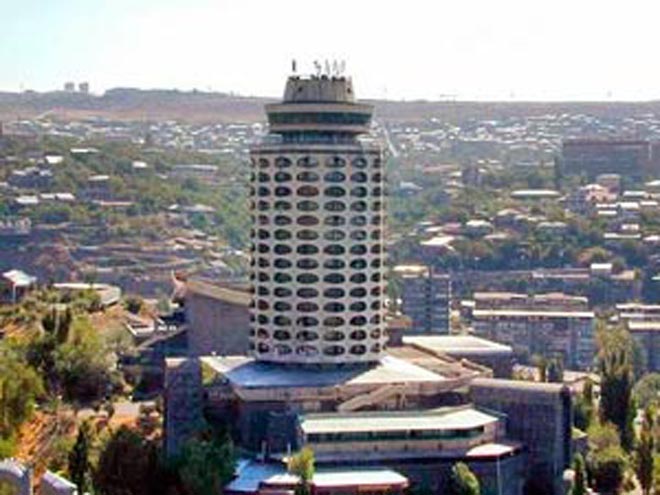Azerbaijan, Baku, 20 October / Trend corr. E.Tariverdiyeva, R.Hafizoglu/ Visits to Armenia of U.S. and Russian officials will establish a new balance of power in the Caucasus and reduce the risk of renewed hostilities in the region to a minimum.
"Officials' visits to the Caucasus and in particular to Armenia were very frequent, for the geopolitical situation has changed, and an active process of finding a new landscape of the Caucasus is underway," said leading Russian military analyst Sergei Markedonov, head of international relations department at the Institute of Political and Military Analysis.
A two-day official visit of Russian President Dmitriy Medvedev to Armenia began today. Settlement of the Nagorno-Karabakh conflict has been one of the main topics of recent discussion between the two nations. That was also discussed during the visit of the Russian Ministry of Foreign Affairs Sergey Lavrov to Yerevan on 3 October, which coincided with a call on Armenia from the U.S. State Department representative Matthew Bryza, one of the OSCE Minsk Group curators, to recognize Nagorno-Karabakh as a territory of Azerbaijan.
The blitz visits to Yerevan of the US Assistant Secretary Daniel Fried and NATO's special representative for South Caucasus Robert Simmons at the end of last week also showed States' interest in resolving this conflict.
The conflict between the two countries of the South Caucasus began in 1988 due to Armenian territorial claims against Azerbaijan. Since 1992, Armenian Armed Forces have occupied 20% of Azerbaijan including the Nagorno-Karabakh region and its seven surrounding districts. In 1994, Azerbaijan and Armenia signed a ceasefire agreement at which time the active hostilities ended. The Co-Chairs of the OSCE Minsk Group ( Russia, France, and the US) are currently holding peaceful negotiations.
According to analysts, even if it is too early after these visits to talk about the final solution of the Nagorno-Karabakh conflict, anyway, possibility of military actions in the Armenia-Azerbaijan conflict area will be definitely minimized.
According to Azerbaijani political scientist Rasim Musabayov, these visits manifest the beginning of practical steps to resolve the conflict, which will either minimize or even remove from the agenda the possibility of renewed hostilities. Both Russia and the West understood that a large-scale arms race is developing, and Azerbaijan is getting strong, while to maintain balance and pump up free arms to Armenia is unprofitable - it does not bring dividends to anyone.
Markedonov also believes the most important achievement of Russian and Western policy towards Armenia is that militaristic rhetoric in the discussion of Nagorno-Karabakh problem went down to nothing.
"There is constructivism on both sides. And a legitimate formula to address the issue, which would be arranged for both sides, is being searched now," Markedonov said to Trend by telephone.
"This is a crucial time for the conflict to be solved, following the recent events in South Ossetia and the increased international assistance and mediation efforts in the whole of the Caucasian region," said European expert for Caucasus Licinia Simao, PhD candidate at the University of Coimbra.
Medvedev's visit should be a starting point for settlement of the Nagorno-Karabakh conflict, said Turkish political expert Sinan Ogan, Director of the Eurasian Research Center. "The two countries are close to solving the problem of Nagorno-Karabakh," Ogan said to Trend by telephone.
The major breakthrough in solving the problem was the endorsement by Armenia of the Turkish initiative Platform for Security and Stability in Caucasus, providing for the settlement of conflicts in the Caucasus.
Russia and Turkey in early September launched a plan to create a "Platform for Security and Stability in Caucasus" for five countries - Azerbaijan, Russia, Georgia, Turkey and Armenia.
" Turkey has taken the lead in supporting stability in the region, both in the framework of NATO membership and EU accession process and also in close cooperation with Moscow. However, Azerbaijan is also a central player for western interests at a time when Russia's assertiveness is increasing. And now there are all prerequisites for settlement of the conflict through joint efforts of Russian, Turkey and the West.
Ogan explains the interest of Russia and the West in bringing together Turkey and Armenia by the fact that the events in Georgia made Armenia completely isolated, and a solution to this problem would help lift the economic blockade of Armenia.
But it was not a final decision on all issues related to Nagorno-Karabakh.
"We pin vain hopes on official visits, while they are intended to crown the ongoing settlement process, and I do not see any prerequisites for an early resolution of the conflict, if keeping in mind not the victory of one side but a compromise that would be accepted by both sides," said Markedonov.
Musabayov agreed with the view of the Russian political scientist, adding that a solution to the conflict is unlikely to be reached soon. Understanding the complexity of the process, the issue will last for another 10-15 years," he said.
"To find a formula through which Armenia will leave the territory outside Karabakh and liberate the occupied territories of Azerbaijan is the agenda issue now, that has a lot," independent expert Musabayov said to Trend .
The correspondent can be contacted at [email protected]






